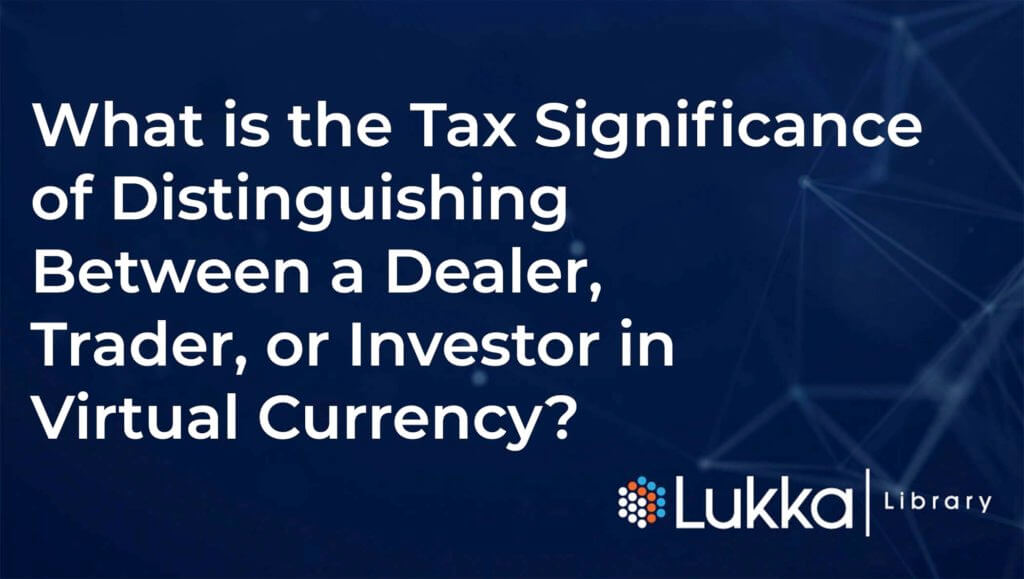Author: Nicholas C. Mowbray, tax attorney at the law firm of BakerHostetler1
This communication does not constitute legal advice or an opinion of BakerHostetler. The views expressed in this article are those of the author.
A taxpayer who purchases and sells investments is classified for tax purposes as an investor, trader, or dealer.2 Distinctions between the three are significant, and a classification as one over the other may lead to substantially different federal income tax consequences.
Investors and Traders
The definition of an investor generally is a taxpayer that seeks to profit from changes in the market price of their holdings, that is, those who attempt to buy low and sell high. Investors anticipate earning a profit from increases in the market value of their long positions and decreases in the market value of their short positions. A trader, in contrast, is generally defined as a taxpayer that seeks to earn a speculative return based on market fluctuations and short-term changes. While both investors and traders act on their own behalves, the key distinction is that a trader is engaged in a trade or business of buying and selling investments, while an investor is passively accumulating earnings by overseeing their investments and is not engaged in a trade or business.
For taxpayers, the distinctions between an investor and a trader are significant. This is because a trader may deduct its business expenses, while an investor may be limited or unable to deduct its expenses.3 Such expenses include, but are not limited to, investment management fees, brokerage fees, interest expense (subject to a separate limitation), and state and local income taxes.4
Unfortunately, there is no bright line test with respect to what constitutes a trader or investor, and the dedication of time and effort to trading activity alone will not be determinative. Instead, it is a question of fact, with the following factors being relevant:
- The nature of the income derived by the taxpayer, with items such as short-term gain and loss indicating the taxpayer is a trader, while items such as long-term capital gain and loss indicating the taxpayer is an investor;
- The frequency, extent, and regularity of the taxpayer’s trading activity. Factors include whether trades are executed on a daily basis, whether there are gap periods between trades, and the trading volume and rate of turnover of the taxpayer’s portfolio; and
- The average holding period of the investments.
Dealers
A taxpayer generally will qualify as a dealer if he or she buys and sells investments and receives income through matching a buyer and seller of an investment by charging a fee. A dealer generally purchases and holds assets as “inventory,” with the expectation of reselling the investments at a profit not because of a rise in the investment’s value, but because the dealer has or hopes to find a market of buyers who will purchase its inventory for a fee.
One of the main distinctions between a trader and a dealer is that a dealer has customers, while a trader does not. To conceptualize this, an example of a dealer in virtual currency is an intermediary that simultaneously converts its customer’s virtual currency into fiat currency, converts its customer’s fiat currency into virtual currency, and swaps its customer’s virtual currency into another virtual currency.
Similar to traders, a dealer will be considered to be engaged in a trade or business and have the ability to deduct its businesses expenses. Differences exist between a trader and dealer, however, including the following:
- A dealer generally earns ordinary income or loss while a trader generally earns short-term capital gain or loss;
- A dealer in securities generally is required to adopt a mark-to-market method of accounting, while dealers in commodities and traders in commodities or securities generally may elect a mark-to-market method of accounting; and
- In general, this method requires the taxpayer to take into income as a gain or loss the amount that would otherwise be recognized if the security or commodity were sold for its fair market value on the last business day of the taxable year, with any gain or loss treated as ordinary income.
- A mark-to-market method allows a taxpayer to avoid certain limitations on the deductibility of capital losses. Such an election, however, first requires establishing a (tax) position that virtual currency is a commodity or security. While the IRS has not issued guidance on this, positions and arguments exist that a virtual currency is a commodity for tax purposes.
- Non-U.S. taxpayers may qualify for certain exemptions from having a taxable presence in the United States as a result of the trading of securities and commodities (as the tax law defines these terms). These exemptions are limited, however, if a non-U.S. taxpayer is a dealer. The same point above regarding establishing a position that a virtual currency is a commodity or security is also relevant to these exemptions.
Takeaways
Additional items that taxpayers should note about these distinctions are the following:
- Whether a taxpayer is an investor, trader, or dealer is a year-to-year determination and is therefore something a taxpayer must analyze on an annual basis; and
- If a U.S. taxpayer holds an interest in a fund that distributes a Schedule K-1 to the taxpayer, whether the activity reported on the Schedule K-1 constitutes investing, trading, or dealing, is made at the fund level.
- In closing, taxpayers that are investors, dealers, and traders should consider the following: ∙ Determining whether they qualify as an investor or trader;
- If a taxpayer is a non-U.S. trader, considering whether their investment activity is exempt from U.S. taxation; and
- If a taxpayer is a trader or dealer, considering whether there is a benefit to a mark-to market election and if so, whether they are eligible.
1 © Baker & Hostetler LLP. Nicholas C. Mowbray is a tax attorney at the law firm of BakerHostetler. This communication may be considered advertising under the rules regulating the legal profession.
2https://www.irs.gov/taxtopics/tc429
3https://www.irs.gov/businesses/small-businesses-self-employed/deducting-business-expenses
4 Pre-2018, an investor could deduct investment expenses with certain limitations. The tax law changes in late-2017 however changed these



